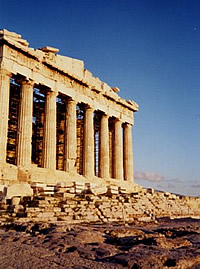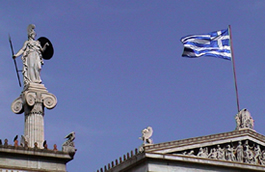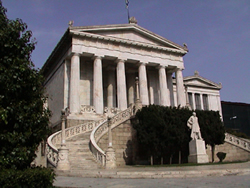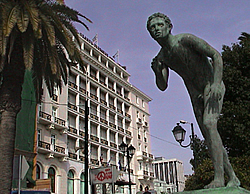Sunlight
saturates the square, turning white wine and whiter faces the golden shades of
Greece. Wild gypsy music streams over the crowd's chatter, the clank of plates
and shrieks of giddy children.
Waiters
bob and weave among the minotaur's maze of tables (indeed, some seem forever lost
to hungry customers). Their trays are laden with delicacies: potato-garlic sauce,
marinated peppers, pickled octopus, stuffed vine leaves, deep-fried eggplant and
plump black Kalamata olives, drenched in olive oil and spangled with oregano.
Fat
wedges of feta crumble over scarlet tomatoes and crescents of cucumber. Pastries
ooze honey and crushed nuts. Milky ouzo swirls in glass tumblers. Overhead,
flowers bloom on wrought-iron balconies. The buildings are freshly-painted in
the charming pastel palette of the Mediterranean, topped with chalky pink terracotta
tiles. The diners linger for hours, savoring the array of appetizers.
Ten
years ago, this vibrant neighborhood was a slum. Another crumbling ghetto
in Athens, where urban planning is sneered. But the Psiri district was
swept up in a wave of gentrification, as the capital prepared to host the 2004
Olympics.
 | | Athens
hopes to remove all scaffolding from the Parthenon before the Olympics. However,
Britain shows little sign of returning the friezes in time - or at all. |
Greece
has its work cut out, reversing centuries of neglect. Athens swiftly declined
from marble marvel to concrete clutter. The elegant "Cradle of Democracy"
fell into squalor after the Roman Empire collapsed. Synesius of Crete, despite
being a bishop, cursed his arrival here in AD 395: "May the sailor who brought
me here die miserably: Athens contains nothing magnificent but place names ...
Where are your glories, wretchedest of cities?"
Four
centuries of Ottoman rule further crippled the city's style: Athens has no great
Renaissance palaces and cathedrals. The 1821 revolution evicted the Turks, but
left the poverty-striken metropolis full of shanties.
Over 1.5 million refugees
arrived - Anatolian Greeks, including Aristotle Onassis - and haphazard slums
raced up the flanks of the surrounding mountains. Illegal construction was common,
even atop ancient ruins.
King
Otho tried to revive Greece's classical heritage, importing German and French
architects, in the 1830s. They laid out tree-lined boulevards and generous squares,
designed splendid buildings like the University, Academy, Observatory and the
Royal Palace (now Parliament). Other dramatic designs emerged in the following
decades, including the National Technical University of Athens, the Archaeological
Museum, Zappeio mansion and the ornate Hotel Grande Bretagne.
Most
builders completely ignored the cue and churned out cheap, tatty apartment blocks.
Today, the Megalo Chorio - the "Big Village" of more than five million
people - has a reputation for cement chaos unrivaled outside the former Soviet
Bloc.
But
the Summer Games have truly galvanized the Greeks, igniting their legendary resourcefulness.
Like Cinderella, Athens is casting off its tatters, revealing a vibrancy and beauty
that utterly captivates.
 |
| Athena,
the goddess of wisdom, watches over the Athens Academy. |
A
sleek new airport, Eleftherios Venizelos, perches on the outskirts. The Metro
boasts 19 new state-of-the art stations, all clean, bright and efficient.
The ruins and relics disturbed by the construction are displayed, so it's possible
to catch a refreshing glimpse of ancient perfume vials and olive oil jugs among
the ticket machines.
Taxi
drivers are undergoing "good manners training" (though geography lessons
might prove more useful). Illegally-parked cars are ticketed and towed - a real
shocker for Athenians accustomed to wedging vehicles onto sidewalks, into parks
and across side streets.
Soon
pedestrian routes will connect all the major classical sites. Families already
stroll along the immaculate Dionissiou Areopagitou Street from the Temple of Olympian
Zeus to the golden outcrop of the Acropolis.
The
capital's notorious smog - nefos - has decreased by 35 percent, thanks
to traffic-calming measures and better emission controls. The fresher air has
lured back the owl, ancient emblem of Athens. Tourists are breathing a sigh of
relief too, as non-smoking sections become mandatory (quite often, a two-table
island in a sea of frantically-puffing Greeks, but it's the thought that counts.
Times are a-changing).
The
city has ripped down illegal billboards and rescued Omonia - a key interchange
- from its seedy slide towards the underworld. Palms and bitter orange trees now
shade squares, where vendors hawk sesame rings and fresh lemonade.
 |
| In
honor of the 2004 Games, Athens restored its neo-classical National Library. |
Major
museums - including Cycladic Art, Benaki and Byzantine - have been expanded.
The flagship National Archaeological Museum will re-open in 2004, after extensive
renovations. The new Acropolis Museum will launch too, though galleries may
be empty: a reminder that Greece's crowning glory is held captive in London.
English
ambassador - and compulsive collector - Lord Elgin carried off the Parthenon friezes
in the early 19th century. The British Museum maintains it legally acquired the
sculptures from the Ottoman government, which controlled Greece at the time. The
directors staunchly refuse to repatriate "The Marbles", shattering hopes
of a triumphant return in 2004.
Athen's
rags-to-riches revival has suffered other setbacks: Many Olympic venues will launch
without test events, just a few days before the Opening Ceremony on August 13th,
2004. Infighting stalled tram and railway construction. The ring road is still
a gleam in its planner's eye.
The
biggest worry - for the 1.5 million spectators - is being told there's no room
at the inn. Already, 80-90 percent of the city's best beds are reserved for the
55,000-strong Olympic Family (referees, sponsors, media etc).
 |
| The
freshly-renovated Hotel Grande Bretagne overlooks the historic Constitution Square
(Syntagma). |
Visitors
shouldn't despair, though. The A-list rooms may be booked, but 10,000 didn't make
the grade. Officials also promise 82,000 beds in the Attica region, about 90 minutes
away by car. Cunard's new Queen Mary II and other cruise ships offer berths in
Piraeus, the capital's undistinguished harbor.
Such
hitches are to be expected. Greece may have given birth to the Olympics over 2000
years ago, and Athens may have staged the first modern tournament in 1896 with
just 245 athletes. But it's still one of the smallest countries to host the event,
let alone the intensive Summer Games.
Make
no mistake: the Greeks will pull through in high style. They thrive on challenge
and ever-so-casually manage small miracles, among all the endless lunches, fiery
debates and utter chaos. No doubt Europe's Cinderella will enjoy her triumph in
2004 - and a new lease on life.
Perhaps
P.B. Shelley's prediction is coming true: "Another Athens shall arise and
to remoter time bequeath, like sunset to the skies, the splendor of its prime."
Lounging
in Psiri, sipping golden wine, it's certainly easy to believe in fairytale endings.
IF
YOU GO...... |
Transport
The
new international airport, Eleftherios Venizelos, gleams (www.athensairport-2001.gr).
Easyjet runs cheap flights from London (www.easyjet.com).
Also try Olympic (www.olympic-airways.gr),
British (www.ba.com) and Virgin
(www.virgin-atlantic.com).
Bus
E95 runs to Syntagma Square, E96 to Piraeus and E94 to the metro at Ethniki Amyna
($5). Eventually, the underground will extend to the airport. In the meantime,
a taxi to the city center costs $25-$30 and takes over an hour.
Metro
tickets are about $1 (www.ametro.gr).
Buses and trolleys also cover most of Athens. A $4.75 day-pass buys unlimited
transport. Hail the yellow taxis by shouting out a destination. Try your luck
with occupied cabs too (the fare is not shared, so note the meter). Radio cabs
charge a €1.80 booking fee: Athina (210.921.7942), Kosmos (1300) or Parthenon
(210.532.3300).
Think
long and hard before renting a car. Parking is a headache in the capital and locals
are infamous for lawless, high-speed driving. And the danger is growing: Road
deaths in Greece jumped 51 percent from 1980-2000, while other European countries
reported declines.
On
the other hand, public transport is not impressive, especially in rural areas.
Should the lure of an idyllic Peloponnesian tour overwhelm safety concerns, there
are many rental companies (mostly clustered on Syngrou, near the Acropolis Metro
stop). Expect to pay at least $250-$300 per week from a company like Avance (210.920.0100)
or Capital (210.921.8830). The rates double at multinational chains.
Where
to stay
Budget
Athens
Camping is 7km west of the city centre on the Corinth road (198 Athinon; 210.581.4114).
Camping in Greece, available from the tourist office, lists all 17 sites in the
province of Attica. See also http://www.travelling.gr/camping/Athens.
The
Student and Traveller's Inn offers dorm beds from $18-$30 and doubles from $65-$80.
This former nursing home is a rabbit-warren of rooms, all good value for money.
Cheery and simple, with a vine-shadowed courtyard (16 Kydathineon; 210.324.4808; http://users.forthnet.gr/ath/students-inn ). The Athens International Youth Hostel is clean and blissfully quiet (thanks
to double-glazing). No curfew. Fee $14/person (16 Victor Hugo; 210.523.4170; www.interland.gr/athenshostel).
Moderate
The
petite Hotel Byron nestles on the edge of the atmospheric Pláka district
(19 Vironos; 210.323.0327; doubles $100-$160). For no-nonsense modern style and
comfort, try the Omonia Grand Hotel. Urban renewal sent the dealers and prostitutes
packing: now you're more likely to see Eurocrats and businesswomen strolling in
this central neighbourhood. The hotel overlooks the main square, once a manic
rotary, now a bland concrete expanse (2 Pireos Street; 210.528.2100; www.grandotel.gr;
doubles $170-$290). |
Luxury
The
St George Lycabettus Hotel perches on the city's highest slope, just above the
chi-chi boutiques and elegant cafes of Kolonaki. The rooftop pool has incredible
views of Athens and the Saronic Gulf (2 Kleomenous; 210.729.0711, www.sglycabettus.gr;
doubles from $400).
The
Hotel Grande Bretagne remains the classic choice: the "First Lady of Hospitality"
has welcomed royalty, celebrities and spies for 130 years. The ornate edifice
overshadows Parliament's peach palace in the heart of Athens. Gleaming from a
$70 million restoration, the hotel offers discounts through June, when the final
frills - pool, sauna, roof-top Acropolis Gardens - are available (Syntagma a.k.a
Constitution Square; 210.333.0000; www.hotelgrandebretagne-ath.gr;
doubles from $360-$670).
Where
to eat
Ouzeri Kouklis doesn't even have a menu: just take your pick
of mezedes - traditional appetisers - from the waiter's tray. Wash down
batter-fried eggplant, flaming sausages and marinated peppers with a bottle of
Mythos beer or jug of local wine, then stroll around the picturesque Pláka
neighbourhood (14 Tripodon Street; 210.324.7605). Eden serves up tasty - but somewhat
over-designed - vegetarian haute cuisine nearby (12 Lyssiou; 210.324.8858).
Athenians
flock to the authentic, homey Taverna Xynos (4 Ag. Geronda; 210.322.1065) and
artsy Kouti (23 Adrianou; 210.321.3229) for lunch. Too busy to stop? Grab a souvlaki
at Mr. Costas (116 Adrianou) or Savvas (Mitropoleos, just before Monstiraki Square).
Top it off with a pastry from the superb Kotsolis sweet shop (112 Adrianou; 210.322.1164).
Kolonaki,
the see-and-be-seen quarter, is filled with trendy eateries, including the frankly-labelled
Central Funky Restaurant (14 Kolonaki Square; 210.724.5938) and Mommy (4 Delphon;
210.361.9682). Celebrate special occasions farther up the hill at elegant Orizontes
Lykavyttou. Diners overlook the city's sparking lights and Saronic Gulf sunset
(reservations essential; on top of Lycabettus hill; accessible by cable car or
path from the top of Ploutarchou Street; 210.722.7065).
History
buffs shouldn't miss ancient Greek cuisine at the torch-lit Archeon Gefsis. The
menu is drawn from the 15-volume Banquet of the Learned, written by 3rd-century
gourmand Athineus. Dishes include chickpeas with beet-root, smoked eel and piglet
stuffed with game, eggs, cheese, fried liver and chestnuts (22 Kodratou Street,
Athens; 210.523.9661; also 10 Epidavrou Street, Piraeus; 210.413.8617; www.arxaion.gr).
Information
Learn
more about Olympic preparations, volunteer schemes and trip planning from the
Athens Olympic Committee (Iolkou & Filikis Etaireias, 142 34 Nea Ionia, Athens;
210.200.4000; www.athens2004.com).
Contact the Greek National Tourist Organisation at 2 Amerikis Street, 105 64 Athens
(210.331.0565; www.gnto.gr).
The
International Herald Tribune includes a section with local news and entertainment
listings (www.ekathimerini.com).
The excellent English paper, the Athens News, is published on Fridays (www.athensnews.gr). |
|